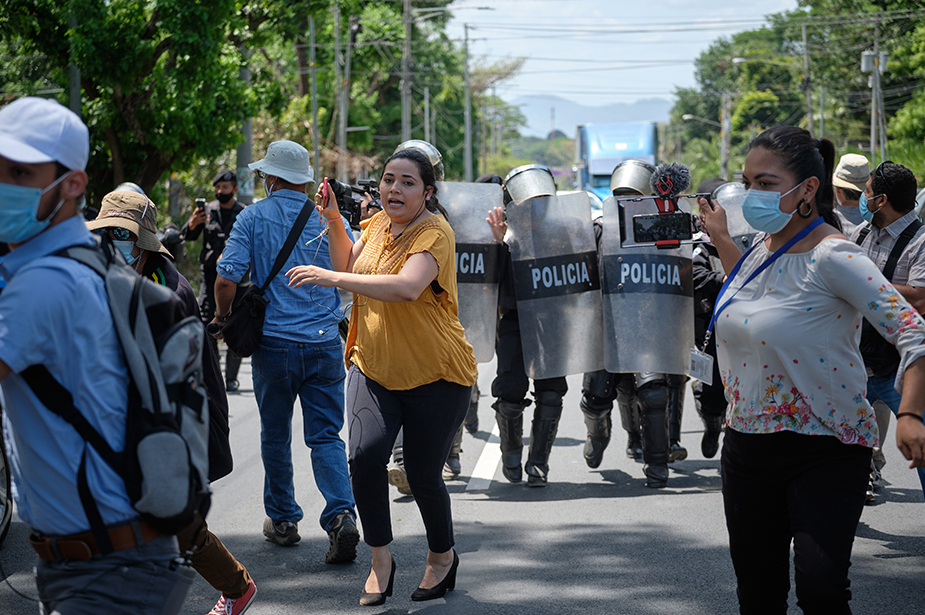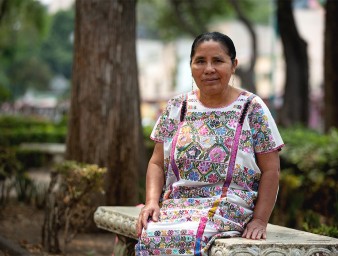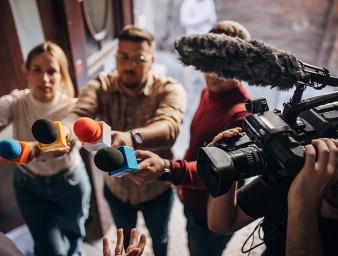Press freedom in Central America: Silence is not an option
06 March 2024

“Online and ‘real life’ media serve as watchdogs and early warning systems for the full range of potential human rights violations,” said UN Human Rights Chief Volker Türk on the safety of journalists. “And that is precisely why journalists are so frequently the targets of threats, violence and even murder. Because their work is so crucial to upholding the human rights of us all.”
In Central America, according to the UN Human Rights Regional Office for Central America and the Caribbean (ROCA), these types of threats and acts of violence are a part of daily life for journalists from a media entity being shut down or forced to move their operations abroad to journalists being exiled, questioned by police, or deprived of their nationality.
“Fear of being questioned should not be a reason to deprive the press of their right to do their job in a free and safe manner,” said Alberto Brunori, UN Human Rights Representative of ROCA, during a panel discussion recently held in Washington, DC, on the situation faced by journalists in the region.
Women journalists are even more at risk, according to Angélica Cárcamo, a Salvadoran journalist and Executive Director of the Central American Network of Journalists.
Cárcamo explained that women journalists are not questioned by the quality of their work rather than the stereotypical characteristics attributed to women in general.
“When a woman journalist publishes an investigation, she is not questioned if the investigation lacks journalistic method or even if she received a bribe in exchange for the investigation,” she said. “Women journalists are criticised for their physical appearance and the way they speak. They are told that they should be at home doing household chores. They are even questioned as to how it is possible that their partners give them ‘permission’ to practice journalism. Even more serious are the messages they receive threatening them with rape. They see a woman as a thing rather than a person with rights.”

Journalists escape from a police crackdown while trying to cover the arrest and raid to Cristiana Chamorro’s house, the daughter of former President of Nicaragua Violeta Barrios. Cristiana was detained before the elections in 2021. © Carlos Herrera
Community journalists also face particularly differentiated risks when practicing journalism.
“Most of them tend to be in small cities or in rural areas, where it is much more difficult to access protection mechanisms and where there tend to be many more criminal acts that can go unpunished,” Cárcamo said.
Keeping the press safe
As a way to take concrete actions to safeguard journalists, the Global Drive for Media Freedom and Safety of Journalists was launched in 2020 to foster an independent and free media and public recognition of the value of access to information, to strengthen the protection and accountability for violations against journalists, especially women journalists. The initiative is supported by the Kingdom of the Netherlands and implemented by UN Human Rights in collaboration with UNESCO.
“Empowering journalists isn't just about freedom, it's about safeguarding democracy itself,” Brunori said. “The Global Drive initiative has been vital to promote an independent press and bolstering accountability. In Central America, where journalists face multiple challenges, this initiative has strengthened our work, identified common challenges and created advocacy opportunities for journalists across the region.”
"This initiative has been extremely important for the Central American Network of Journalists," said Marielos Monzón, a Guatemalan journalist and vice-president of the Central American Network of Journalists.
According to Monzón, the initiative has provided support in several ways, such as gathering information on the situations faced by journalists in the region. For example, the initiative supported a consultation with 340 Central American journalists to find out about the context of freedom of expression and the threats they suffer.
The Office also supported the drafting and publication of a report on freedom of expression, access to information and the practice of journalism in Central America, which has contributed to finding real solutions. The report provided information on the effectiveness of protection measures and mechanisms for journalists in the countries that have implemented them, as well as the forms of intimidation, the main impacts, the mechanisms to which journalists who have been violated turn, the organisations that support them, and a series of recommendations by country.
"It has been extremely important to have the possibility of carrying out a study on the protection mechanisms. At a moment as serious as the one Central America is going through, there should be a real possibility for journalists to be protected and to be able to do our work," Monzón said.
In addition, the report includes information disaggregated by gender, by who carries out acts of harassment or aggression, and differentiated aggressions against women journalists and community journalists. It also includes information on the use of regional and international mechanisms.
"The study validates crucial information that the Office has been monitoring and offers a detailed overview of the most recurrent challenges, difficulties and harassment faced by journalists in the region," Brunori said. "Our intention is to work on the continuous updating of this data and the strengthening of journalists' networks, keeping alive the conversation and actions in favour of freedom of the press and the safety of those who exercise it."
“We have to protect journalists because we are not only defending our right to inform but also defending the right of the population to be informed,” said Carlos Herrera, Nicaraguan journalist, and member of the Central American Network of Journalists. He is convinced that this is the best way to defend journalism in the region.
“
It is essential that States recognise that there is no progress without a free press. Fear of criticism does not justify, under any circumstances, the restriction of the right of those who practice journalism to carry out their work safely. This is a fundamental right that fosters democracy and freedom in all societies.
“
Alberto Brunori, UN Human Rights Regional Office for Central America and the Caribbean Representative
According to Monzón, working on this report hand in hand with UN Human Rights has fostered alliances and a way towards the realization of the right to freedom of expression and access to information for all citizens.



